McGRAW-HILLS
Conversational
American EnglishThe Illustrated Guide to the Everyday Expressions of American English
McGRAW-HILLS
Conversational American English
The Illustrated Guide to the Everyday Expressions of American EnglishRICHARD A. SPEARS BETTY BIRNER STEVEN KLEINEDLER
Illustrated by Luc Nisset

Copyright 2011 by The McGraw-Hill Companies, Inc. All rights reserved. Printed in the United States of America. Except as permitted under the United States Copyright Act of 1976, no part of this publication may be reproduced or distributed in any form or by any means, or stored in a database or retrieval system, without the prior written permission of the publisher. ISBN: 978-0-07-174132-3 MHID: 0-07-174132-1 The material in this eBook also appears in the print version of this title: ISBN: 978-0-07-174131-6, MHID: 0-07-174131-3.
All trademarks are trademarks of their respective owners. Rather than put a trademark symbol after every occurrence of a trademarked name, we use names in an editorial fashion only, and to the benefit of the trademark owner, with no intention of infringement of the trademark. Where such designations appear in this book, they have been printed with initial caps. McGraw-Hill eBooks are available at special quantity discounts to use as premiums and sales promotions, or for use in corporate training programs. To contact a representative please e-mail us at bulksales@mcgraw-hill.com. (McGraw-Hill) and its licensors reserve all rights in and to the work. (McGraw-Hill) and its licensors reserve all rights in and to the work.
Use of this work is subject to these terms. Except as permitted under the Copyright Act of 1976 and the right to store and retrieve one copy of the work, you may not decompile, disassemble, reverse engineer, reproduce, modify, create derivative works based upon, transmit, distribute, disseminate, sell, publish or sublicense the work or any part of it without McGraw-Hills prior consent. You may use the work for your own noncommercial and personal use; any other use of the work is strictly prohibited. Your right to use the work may be terminated if you fail to comply with these terms. THE WORK IS PROVIDED AS IS. McGRAW-HILL AND ITS LICENSORS MAKE NO GUARANTEES OR WARRANTIES AS TO THE ACCURACY, ADEQUACY OR COMPLETENESS OF OR RESULTS TO BE OBTAINED FROM USING THE WORK, INCLUDING ANY INFORMATION THAT CAN BE ACCESSED THROUGH THE WORK VIA HYPERLINK OR OTHERWISE, AND EXPRESSLY DISCLAIM ANY WARRANTY, EXPRESS OR IMPLIED, INCLUDING BUT NOT LIMITED TO IMPLIED WARRANTIES OF MERCHANTABILITY OR FITNESS FOR A PARTICULAR PURPOSE.
McGraw-Hill and its licensors do not warrant or guarantee that the functions contained in the work will meet your requirements or that its operation will be uninterrupted or error free. Neither McGraw-Hill nor its licensors shall be liable to you or anyone else for any inaccuracy, error or omission, regardless of cause, in the work or for any damages resulting there from. McGraw-Hill has no responsibility for the content of any information accessed through the work. Under no circumstances shall McGraw-Hill and/or its licensors be liable for any indirect, incidental, special, punitive, consequential or similar damages that result from the use of or inability to use the work, even if any of them has been advised of the possibility of such damages. This limitation of liability shall apply to any claim or cause whatsoever whether such claim or cause arises in contract, tort or otherwise.
Contents
About This Dictionary
Every language has conventional and much-used ways of expressing even the most commonplace requests, inquiries, or responses.
Some of these expressions are idioms or idiomatic. Others are perfectly understandable and literal English, but people unfamiliar with the language may have difficulty formulating them in typical and conventional ways. Derived from NTCs Dictionary of Everyday American English Expressions, this book is a collection of nearly 5,000 such expressions grouped into 464 topics that are listed under 11 major categories of social interaction. New to this reference are extensive illustrations that place numerous expressions in a visual context, facilitating understanding and memorization. The complete list of major category headings and their topics can be found in the Topic and Situation Index, beginning on page xi. This index can also be used for browsing through the topics.
See a complete explanation of how to use this index on page xi. Each of the 464 topics has been assigned a number, and these numbers are the basis of the indexing systems. The numbers appear at the beginning of each topic heading in the body of the book to aid in finding a particular topic.
Using This Dictionary
The meaning of the expressions can be determined from the topic heading. All the expressions under a particular heading convey essentially the same type of information. The expressions themselves contain hints and explanations where necessary.
For instance, in the expression... I got sidetracked. sidetracked = detoured; distracted ... the equal sign (=) indicates that the word or phrase on the left is defined as the word or phrase on the right. In the expression... the = indicates that the word or phrase on the left can be replaced by any of the words or phrases on the right. the = indicates that the word or phrase on the left can be replaced by any of the words or phrases on the right.
In the expression... Get off your high horse. (informal) = Be less arrogant. ... the equal sign (=) at the beginning of the line indicates that a restatement of the entire expression follows. In the expression... the word slang in parentheses indicates the register or usage of the expression. the word slang in parentheses indicates the register or usage of the expression.
Other similar indicators are Biblical, clich, euphemistic, folksy, formal, French, German, idiomatic, informal, ironic, Italian, Japanese, jocular, juvenile, Latin, mild oath, mildly vulgar, oath, rude, sarcastic, Spanish, taboo, and vulgar. In the expression... Fore! (said in golfing when the ball is struck) ... the information in parentheses explains something about the context in which the expression is used.
Topic and Situation Index
This index includes 11 major category headings, under which the topics for each category appear in boldface type. The specific expression groups for each topic are then presented in the order in which they are found in the list of expressions.
A topic number, rather than a page number, is provided after each topic description, indicating where to find that topic in the list. For instance, if you wanted to find an expression having to do with a pain in the head, you would look under the category Personal Matters for a group of expressions labeled Sickness. Under Sickness you would find the expression group Describing a pain in the head . Look for Describing a pain in the head at number 326 in the list of expressions.
Conversational American English Expressions
BASIC SOCIAL ENCOUNTERS
Greetings
1 Simple greetings
Next page

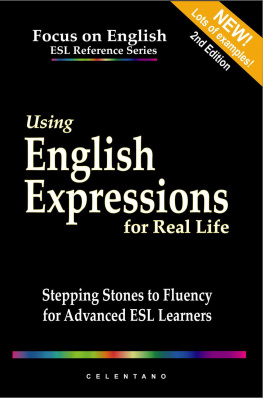
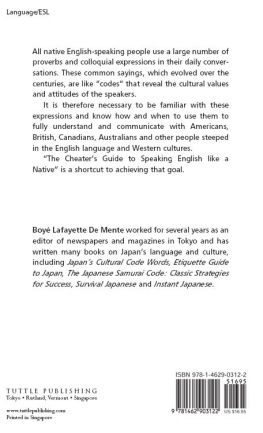
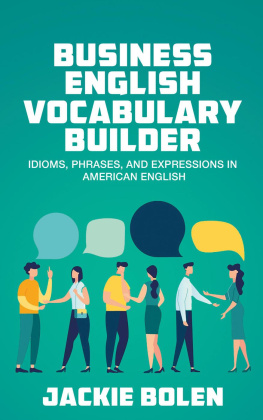


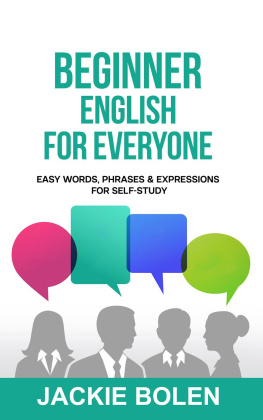
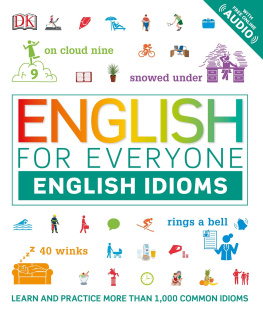

 Copyright 2011 by The McGraw-Hill Companies, Inc. All rights reserved. Printed in the United States of America. Except as permitted under the United States Copyright Act of 1976, no part of this publication may be reproduced or distributed in any form or by any means, or stored in a database or retrieval system, without the prior written permission of the publisher. ISBN: 978-0-07-174132-3 MHID: 0-07-174132-1 The material in this eBook also appears in the print version of this title: ISBN: 978-0-07-174131-6, MHID: 0-07-174131-3.
Copyright 2011 by The McGraw-Hill Companies, Inc. All rights reserved. Printed in the United States of America. Except as permitted under the United States Copyright Act of 1976, no part of this publication may be reproduced or distributed in any form or by any means, or stored in a database or retrieval system, without the prior written permission of the publisher. ISBN: 978-0-07-174132-3 MHID: 0-07-174132-1 The material in this eBook also appears in the print version of this title: ISBN: 978-0-07-174131-6, MHID: 0-07-174131-3.